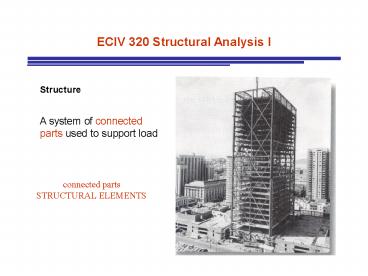ECIV 320 Structural Analysis I - PowerPoint PPT Presentation
1 / 40
Title: ECIV 320 Structural Analysis I
1
ECIV 320 Structural Analysis I
Structure
A system of connected parts used to support load
connected parts STRUCTURAL ELEMENTS
2
Structural Elements
- Tie Rods
- (bracing struts)
- Tensile Forces
- Usually Slender
3
Structural Elements
- Beams
- Characteristics
- Straight horizontal members
- Carry Primarily vertical loads
- Resist mainly bending
- Material
- Steel
- Reinforced Concrete
- Wood
4
Structural Elements
- Columns
- Characteristics
- Vertical members
- Carry primarily vertical loads
- Resist mainly compressive forces
- Beam-Columns (Resist flexure)
5
Types of Structures
- Trusses
- Planar
- Bridge, Roof support
- Space
- Towers, Derricks
Structure in Bending Members in Axial
6
Types of Structures
- Cables
- Carry Loads in Tension
- Building Roofs, Bridges
7
Types of Structures
- Arches
- Carry Loads in Compression
- Bridges
- Dome Roofs
- Openings in Masonry walls
8
Types of Structures
- Frames
- Composed of Beams Columns
- Pin or Fixed Connections
- 2-D or 3-D
- Bending
9
Types of Structures
- Surface Structures
- Made of materialhaving very smallthickness
- Very flexible membrane action
- Rigid plates and shells
10
Design Loads
Most important and difficult task is the accurate
estimation of loads applied to a structure over
its life
Second most difficult is to determine load
combinations
11
Design Loads - Types
Types of Loads
Dead Loads
Live Loads
- Weight of structural members
- Objects permanently attached to structure
- Vary in magnitude and location
- Objects temporarily attached to structure
12
Design Loads - References
References General Building Codes
ASCE Minimum design loads for buildings and other
structures ASCE 7-02, ASCE 7-05
International Building Code Whittier CA,
International Conference of Building Officials
References Bridge Design Codes
Standard Specifications for Highway Bridges
(AASHTO)
Specifications for Steel Railway Bridges (AREA)
13
Design Loads - References
References Design Codes
Building Code Requirements for Reinforced
Concrete (ACI) Manual of Steel Construction
(AISC) National design Specification for Wood
Construction (American Forest and Paper
Association)
14
Design Loads Densities of Materials
15
Design Loads densities of Materials
16
Design Loads Minimum Dead
17
Design Loads - Minimum Dead
18
Dead Loads - Example
19
Dead Loads - Example
20
Live Loads
- Building Loads
- Bridge Loads
- Wind Loads
- Snow Loads
- Earthquakes
- Hydrostatic and Load Pressure
- Other Natural Loads
21
Live Loads - Buildings
22
Live Loads Bridges
- AASHTO
- Wheel loading and spacing
- Series of loadings at critical locations
- Dynamic Effects - Impact
23
Wind Loads
Wind velocity depends on Height Terrain
Winds kinetic energy is converted to potential
energy
24
Wind Loads
http//www.camerashoptacoma.com/mpegs/TacomaNarrow
sBridge.mpg
25
Wind Loads
Dynamic or Static Approach
Static Approach (not suitable for high-rise
buildings)
- Static Approach 2-Step Process
- Step 1 Compute Kinetic Energy
- Step 2 Compute Wind Pressure on Surfaces
26
Wind Loads Step 1
Wind Kinetic Energy q0.5rV2
ASCE 7-02 modifies q to account for importance of
structure, height and terrain
27
Wind Loads Step 1
28
Wind Loads Step 1
29
Wind Loads Step 1
30
Wind Loads Step 1
31
Wind Loads Step 2
External Pressure
Internal Pressure
32
Wind Loads Step 2
33
Wind Loads Step 2
34
Wind Loads Step 2
35
Wind Loads Step 2
36
Wind Loads Step 2
37
Wind Loads Step 2
38
Snow Loads
39
Load Combinations
- Structural Design is not an action movie!
- Loads could act simultaneously
- Uncertainty Probability Theory LRFD
- 1.4 (DL)
- 1.2(DL) 1.6(LL) 0.5(SL)
- 1.2(DL) 1.5(E) 0.5(LL)
- etc
40
Homework
- Reading Assignment
- Section 1.1 1.4
- Examples 1.1 1.4
- Live Load Reduction, Design Wind Pressure for
Signs - Homework Problems 1-3, 1-6, 1-9, 1-16, 1-17































